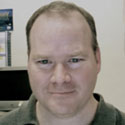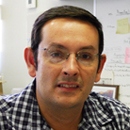Academic Editors
The following people constitute the Editorial Board of Academic Editors for PeerJ. These active academics are the Editors who seek peer reviewers, evaluate their responses, and make editorial decisions on each submission to the journal. Learn more about becoming an Editor.

Jenny Renaut
Responsible of the Environmental Research and Technology Platform
since 2015, and Leader of the Integrative Biology Platform at Luxembourg Institute of Science and Technology, including proteomics, metabolomics and genomics laboratories. Specialized in Plant proteomics, Chairwoman of the COST action FA0603 'Plant Proteomics in Europe', general secretary of the International Plant Proteomics Organization

Philip L Reno
I earned by Ph.D. in Biological Anthropology and Biomedical Sciences from Kent State University and then completed a postdoc in developmental biology at Stanford University. I am currently an Professor of Anatomy and Embryology in the department of Bio-Medical Sciences at PCOM. My research focus is uncovering developmental mechanisms underlying human specific traits.

David H. Reser
Lecturer, Behavioural and Systems Neuroscience Group, Department of Physiology. Founding Director and Inaugural President (2014-2015) of the Society for Claustrum Research.

Yasser Riazalhosseini
After undertaking post-doctoral studies on Cancer Genomics at the Deutsches Krebsforschungszentrum (DKFZ; German Cancer Research Centre), Yasser Riazalhosseini joined the Department of Human Genetics at McGill as an Assistant Professor, and was appointed Group Head of the Cancer Genomics program at the McGill University Genome Centre. His principal activity has been to initiate and lead a multidisciplinary, applied research program on cancer genomics, with the goals of obtaining better preventions and treatments. His research program uses systems biology approaches that combine genomics datasets involving sequences from hundreds of cancers coupled with detailed clinical data, and functional studies.

Ana I.F. Ribeiro-Barros
PhD in Plant Molecular Biology (1997, Wageningen University and Research);
Director of the Tropical College, University of Lisbon (ULisboa);
Head of Research Lab and Professor of Cell Biology, Biotechnology, Microbiology and Tropical Ecosystems (School of Agriculture, ULisboa);
Invited professor Universidade da Madeira (Portugal), Eduardo Mondlane University and Gorongosa National Park (Mozambique;
Area of scientific activity (25+ years): Agrobiotechnology applied to the management and characterization of agro-forestry resources: Biodiversity; Conservation Genetics; Ethnobotany; Landscape genomics; Molecular Ecology; Plant-Environment Interactions (symbioses, pathogenesis and abiotic stresses); Soil diversity.
Scientific Identifiers:
Ciência Vitae: 081F-E3CE-9D52
ORCID: 0000-0002-6071-6460
Scopus: 35557486600
Google: https://scholar.google.pt/citations?hl=en&authuser=2&user=hzAWUTUAAAAJ

Eduardo M Richter
Eduardo M. Richter is graduated in Chemistry from the University of Santa Cruzdo Sul, Brazil (1994), and received his master’s (2000) and Ph.D. degree (2004) in Analytical Chemistry from the University of São Paulo, Brazil. He completed a postdoctoral research at the University of São Paulo, Brazil during 2005. He is currently Associate Professor of the Institute of Chemistry at the Federal University of Uberlândia, Brazil. His current research interests focus on the development of new analytical methods using capillary electrophoresis with conductometric detection and flow-injection and batch-injection analyses with amperometric detection.

Simone Riehl
Lecturer for Environmental Archaeology at the University of Tübingen. Interdisciplinary Research Fellowship, Center for Climatic Research at the University of Wisconsin-Madison. Heisenberg awardee at the University of Freiburg. Member of the Tübingen-Senckenberg Center for Human Evolution and Paleoecology. Archaeobotanist in several archaeological excavations in the Near East, including Turkey, Syria, Lebanon, Israel, Jordan and Iran.

Leslie Ries
Leslie Ries is an ecologist who focuses on patterns at both medium and large scales. She has worked both in the fields of landscape ecology and biogeography with her focus mainly on butterflies. Over the last 10 years, she has shifted from a field approach to using large databases, mostly originating from citizen science monitoring networks.

Juan R. Riesgo-Escovar
Professor of Biology at the Instituto de Neurobiología at the Mexican National Autonomous University. Recipient of the Young Investigator Award for Natural Sciences of UNAM. Former President of the Mexican Society of Developmental Biology. Current president of the Latin American Society of Developmental Biology.

John M Ringo
Professor Emeritus of Biology, University of Maine. Past Associate Editor, Behavior Genetics and past Associate Editor, Evolution.

Christian Rinke
Christian Rinke is a Research Officer at the Australian Centre for Ecogenomics (ACE), University of Queensland, Australia. He received his PhD in Zoology from the Marine Biology Department at the University of Vienna, Austria and has since shifted his focus to the microbial world.
His research interests include genomics and the phylogeny and ecology of symbiotic and free living microbes. He focuses in particular on the uncultured majority of microbes (99%) which elude current culturing efforts. This so called “Microbial Dark Matter” can only be explored with culture-independent methods. Chris pioneered methods in high throughput single-cell genomics, the separation and sequencing of single bacterial and archaeal cells, and also employs metagenomics (the direct sequencing of environmental samples) to illuminate microbial dark matter.

Coen J. Ritsema
Professor of Soil Physics and Land Management at Wageningen University, the Netherlands. Recipient of Honorary Professorships at i) Deakin University, Australia, ii) the Institute of Soil and Water Conservation, Chinese Academy of Sciences, China, and iii) Moscow State University of Environmental Engineering, Russia.

